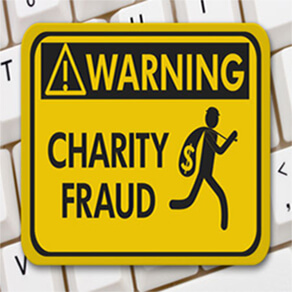
‘Tis The Season for Charity — and Charity Fraud
Americans generally feel generous during the holidays and usually are eager to donate to worthy charitable causes. At the same time, they’re so busy and rushed with holiday activities they don’t necessarily vet charities that ask for support. Fraud perpetrators masquerading as nonprofits usually find easy pickings.
Charity scammers use every available channel to defraud charitable donors — door-to-door appeals, telemarketing campaigns, email messages, slick looking websites and even through social media “friends.” To ensure your donations reach the genuinely needy, exercise healthy skepticism and take precautions.
Know Your Nonprofit
The best and easiest way to avoid becoming a charity scam victim is to donate only to charities you already know and trust. However, by doing this, it’s possible you could exclude new or lesser-known charities from consideration. So if you want to donate to an unknown group, ask the organization to provide as much information as possible — including its tax ID number. Then verify the charity’s status with the IRS and its activities and financials on watchdog sites such as charitynavigator.com and charitywatch.com.
Also make sure you understand how the charity intends to use your donation. This is just as true for established nonprofits. If it isn’t clear where your donation will go or if the charity’s representative seems to dodge the question, walk away.
Best Practices
Here are some other tips to help you avoid becoming a charity fraud victim:
Don’t answer suspicious calls. Caller ID makes it easy to ignore calls from numbers you don’t recognize. Unfortunately, perpetrators may mask their phone numbers with the names and numbers of legitimate charities. The simple solution: Tell the caller you don’t donate money over the phone and hang up.
Ignore suspicious emails. Don’t open unfamiliar and unsolicited emails or click on any links they include.
Avoid in-person sales pitches. Place a “No Solicitors” sign at your front door to discourage con artists. If you inadvertently open the door to a stranger, inform the person that you don’t donate to charities unless they send information in the mail. Fake charities usually won’t.
Don’t bend to pressure. No matter how compelling the sales pitch, or how “urgent” the charity’s need, take time to review and research it. Tell solicitors that you’ll get back to them later. Be particularly wary about pitches in the aftermath of natural disasters and other emergencies.
Donate with credit cards. Using credit cards to make charitable donations provides a level of protection because you usually can dispute fraudulent charges. If you discover a discrepancy when reviewing monthly statements, contact the charity and your credit card company immediately. Debit cards generally offer less protection against unauthorized charges. And paper checks are easy to counterfeit.
Heinous Crime
Charity fraud is a particularly heinous crime because it hurts both the charitably inclined and those in need of help. If you suspect someone is perpetrating a scheme, stay away from the fraudster and report the person to law enforcement.
